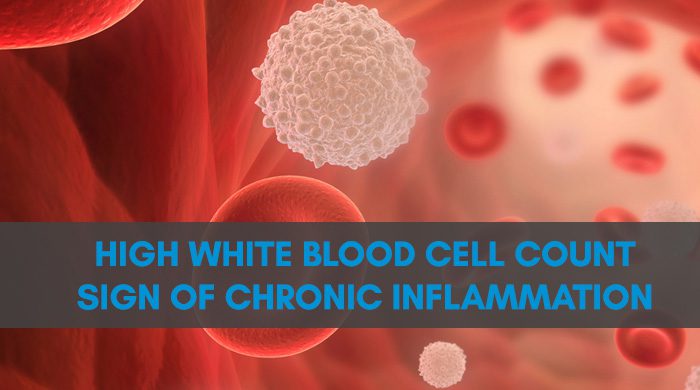High White Blood Cell Count Is A Sign Of Illness

White Blood Cells
White blood cells play a very important part of the immune system and supporting health and vitality. The body needs a certain amount of white blood cells circulating in the blood on a seek and destroy mission to remove pathogens and toxins.
This is part of the natural and ongoing defense against environmental antigens. People in rural African societies who ate a naturally anti-inflammatory plant based diet had a white blood cell count around 4-5. Chronic disease was basically non-existent in these societies.
The current acceptable range for white blood cells is 4.5 – 11. People who ate a Western diet more commonly suffered from chronic inflammatory diseases like heart disease and common cancers. Their white blood cell counts were normally on the higher side of the range.[1]
Check your white blood cell (leukocyte) level from your blood work results the next time you go for a checkup.
High White Blood Cell Count and Chronic Inflammation
A constantly high white blood cell count is not a good thing and is an indication your health is compromised. It is a predictor for all-cause mortality including lung function decline and cardiovascular and cancer mortality.[2]
A day-to-day high white blood cell count is a marker for chronic inflammation. The body will continuously produce more than the normal amount of white blood cells in response the chronic ingestion of pathogens and toxins. The primary source of these antigens come from consuming meat, dairy, and processed foods.
The continual immune response to the oxidative stress caused by these foods results in chronic inflammation that undermines the health of organs.
High White Blood Cell Count and Heart Disease
A high white blood cell count is also problematic because it also appears to directly undermine blood flow and support heart disease.
Since the 1970’s researchers have known higher heart attack risk has been associated with high white blood cell count.
A high white blood cell count appears to be more than an inflammatory response to pathogens and toxins, and directly causes inflammation.
Dr. Greger pointed out in the video the average diameter of white blood cells is 7.5 micrometers. The average size of capillaries in the heart is 5.7 micrometers.[3]
White blood cells have to squeeze their way through the capillaries in the heart and the increase in white blood cells can reduce blood flow.
This can lead to white blood cells bursting, releasing its chemical compounds, and damaging capillaries in the heart.
Consuming Alkaline Plant Foods Reduce Chronic Inflammation and Excess Production of White Blood Cells
Consuming meat, dairy, and processed foods introduces pathogens and toxins into the body. Constantly consuming them results in chronic inflammation.
In contrast, alkaline plant foods flood the body with minerals and phytonutrients that reduce inflammation and oxidative stress.
Learn About Anti-Inflammatory Alkaline Plant Based Foods on the Dr. Sebi Nutritional Guide »
[1] Revision in reference ranges of peripheral total leukocyte count and differential leukocyte percentages based on a normal serum C-reactive protein level.
[2] Baseline total and specific differential white blood cell counts and 5-year all-cause mortality in community-dwelling older women.
[3] Why Does the White Blood Cell Count Predict Mortality?






